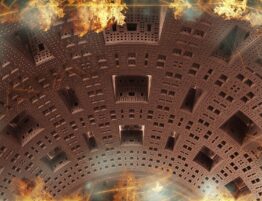
The Eternal State (Part 5)
The Final Future of the Unbeliever
Unlike the believer, the unbeliever will be in a place where they will experience suffering and loss. The Lord had a great deal to say about hell and often warned people about this place of judgment:
Don’t fear those who kill the body but are not able to kill the soul; rather, fear him who is able to destroy both soul and body in hell (Matthew 10:28)
Woe to you, Chorazin! Woe to you, Bethsaida! For if the miracles that were done in you had been done in Tyre and Sidon, they would have repented in sackcloth and ashes long ago. But I tell you, it will be more tolerable for Tyre and Sidon on the day of judgment than for you. And you, Capernaum, will you be exalted to heaven? No, you will go down to Hades. For if the miracles that were done in you had been done in Sodom, it would have remained until today. But I tell you, it will be more tolerable for the land of Sodom on the day of judgment than for you (Matthew 11:21-2).
And if your eye causes you to fall away, gouge it out and throw it away. It is better for you to enter life with one eye than to have two eyes and be thrown into hellfire (Matthew 18:9).
Then he will also say to those on the left, ‘Depart from me, you who are cursed, into the eternal fire prepared for the devil and his angels (Matthew 25:41).
There was a rich man who would dress in purple and fine linen, feasting lavishly every day. But a poor man named Lazarus, covered with sores, was lying at his gate. He longed to be filled with what fell from the rich man’s table, but instead the dogs would come and lick his sores. One day the poor man died and was carried away by the angels to Abraham’s side. The rich man also died and was buried. And being in torment in Hades, he looked up and saw Abraham a long way off, with Lazarus at his side. “Father Abraham!” he called out, “Have mercy on me and send Lazarus to dip the tip of his finger in water and cool my tongue, because I am in agony in this flame!”
“Son,” Abraham said, “remember that during your life you received your good things, just as Lazarus received bad things, but now he is comforted here, while you are in agony. Besides all this, a great chasm has been fixed between us and you, so that those who want to pass over from here to you cannot; neither can those from there cross over to us.”
“Father,” he said, “then I beg you to send him to my father’s house—because I have five brothers—to warn them, so that they won’t also come to this place of torment.”
But Abraham said, “They have Moses and the prophets; they should listen to them.”
“No, father Abraham,” he said. “But if someone from the dead goes to them, they will repent.”
But he told him, “If they don’t listen to Moses and the prophets, they will not be persuaded if someone rises from the dead” (Luke 16:19-31).
The one who believes in the Son has eternal life, but the one who rejects the Son will not see life; instead, the wrath of God remains on him (John 3:36).
and come out—those who have done good things, to the resurrection of life, but those who have done wicked things, to the resurrection of condemnation (John 5:29).
His use of the imagery of fire about the fate of the unbeliever points to the conscious pain and misery. Even though there was sorrow in His heart, Jesus spoke plainly and forcibly about the final future of the wicked.
Hell is divided into at least four parts. In the Greek New Testament, there are four different words to describe the underworld. They each describe a unique division of this awful place:
- The Abyss or Bottomless Pit: The place where:
- Some demons are presently confined who will be released for a period of five months during the Tribulation to afflict the lost.
The fifth angel blew his trumpet, and I saw a star that had fallen from heaven to earth. The key for the shaft to the abyss was given to him. He opened the shaft to the abyss, and smoke came up out of the shaft like smoke from a great furnace so that the sun and the air were darkened by the smoke from the shaft. Then locusts came out of the smoke on to the earth, and power was given to them like the power that scorpions have on the earth. They were told not to harm the grass of the earth, or any green plant, or any tree, but only those people who do not have God’s seal on their foreheads. They were not permitted to kill them but were to torment them for five months; their torment is like the torment caused by a scorpion when it stings someone (Revelation 9:1–5).
- Satan will be bound for one thousand years during the millennial kingdom.
Then I saw an angel coming down from heaven holding the key to the abyss and a great chain in his hand. He seized the dragon, that ancient serpent who is the devil and Satan, and bound him for a thousand years. He threw him into the abyss, closed it, and put a seal on it so that he would no longer deceive the nations until the thousand years were completed. After that, he must be released for a short time (Revelation 20:1–3).
- Tartarus: a permanent place of detention where the angels who sinned in Genesis 6:1–4 are being held until they are finally cast into the lake of fire (Jude 1:6–7).
- Hades: a place where the souls of lost people are presently confined while they await the final day of judgment.
- Gehenna: the final place of anguish, agony, and suffering for Satan, demons, and all the lost.
The devil who deceived them was thrown into the lake of fire and sulfur where the beast and the false prophet are, and they will be tormented day and night forever and ever… Death and Hades were thrown into the lake of fire. This is the second death, the lake of fire. And anyone whose name was not found written in the book of life was thrown into the lake of fire (Revelation 20:10, 14–15).
Gehenna is also called “the lake of fire and sulfur” (Revelation 20:10), “the lake of fire” (Revelation 20:14), and “the second death” (Revelation 20:6, 14) because it is a place of final, eternal separation from God.
The Lord Jesus clearly taught that:
- Hell is a place:
He will cut him to pieces and assign him a place with the hypocrites, where there will be weeping and gnashing of teeth (Matthew 24:51).
Because I have five brothers—to warn them, so that they won’t also come to this place of torment (Luke 16:28).
- Hell is a place of enforced separation from His presence:
Then I will announce to them, “I never knew you. Depart from me, you lawbreakers!” (Matthew 7:23).
- As a place of darkness, its only sounds will be weeping and the gnashing of teeth:
But the sons of the kingdom will be thrown into the outer darkness where there will be weeping and gnashing of teeth (Matthew 8:12).
- Hell is a place of memory. Those in hell:
- Will have a continued consciousness and immediate awareness of where they are. In Luke 16:19–31, the rich man immediately knew where he was.
- Will have identity—the rich man knew who he was.
- Will have memory—the rich man remembered his five brothers and Lazarus.
- Hell is a place of conscious torment. The worst part of hell is that there will be torment and agony. The rich man said, “I am in agony in this flame” (Luke 16:24). He described Hades as “this place of torment” (16:28).
- Hell is a fate far worse than one’s physical death:
Don’t fear those who kill the body but are not able to kill the soul; rather, fear him who is able to destroy both soul and body in hell (Matt. 10:28).
- It will contain punishments varying in severity:
But I tell you, it will be more tolerable for Tyre and Sidon on the day of judgment than for you. And you, Capernaum, will you be exalted to heaven? No, you will go down to Hades. For if the miracles that were done in you had been done in Sodom, it would have remained until today. But I tell you, it will be more tolerable for the land of Sodom on the day of judgment than for you (Matthew 11:22-24).
Concerning the final future of the unbeliever, the Scriptures teach that several realities will exist. Louis Berkhof writes,
“It may be said to consist in (a) a total absence of the favor of God; (b) an endless disturbance of life as a result of the complete domination of sin; (c) positive pains and sufferings in body and soul; and (d) such subjective punishments as pangs of conscience, anguish, despair, weeping, and gnashing of teeth, Matt. 8:12; 13:50; Mark 9:43, 44, 47, 48; Luke 16:23, 28; Rev. 14:10; 21:8. Evidently, there will be degrees in the punishment of the wicked. This follows from such passages as Matt. 11:22, 24; Luke 12:47, 48; 20:17.”1
It appears that the Great White Throne judgment, where several “books” will be opened, is to determine the degree of punishment to be suffered by those who reject the revelatory light they had received. All who appear will be eternally separated from the Lord, but there will be some differences between them.
Then I saw a great white throne and one seated on it. Earth and heaven fled from his presence, and no place was found for them. I also saw the dead, the great and the small, standing before the throne, and books were opened. Another book was opened, which is the book of life, and the dead were judged according to their works by what was written in the books. Then the sea gave up the dead that were in it, and death and Hades gave up the dead that were in them; each one was judged according to their works. Death and Hades were thrown into the lake of fire. This is the second death, the lake of fire. And anyone whose name was not found written in the book of life was thrown into the lake of fire (Revelation 20:11-15).
The punishment of the wicked is eternal:
If your hand or your foot causes you to fall away, cut it off and throw it away. It is better for you to enter life maimed or lame than to have two hands or two feet and be thrown into the eternal fire (Matthew 18:8).
Then he will also say to those on the left, “Depart from me, you who are cursed, into the eternal fire prepared for the devil and his angels… And they will go away into eternal punishment, but the righteous into eternal life” (Matthew 25:41, 46).
They will pay the penalty of eternal destruction from the Lord’s presence and from his glorious strength (2 Thessalonians 1:9).
And the smoke of their torment will go up forever and ever. There is no rest day or night for those who worship the beast and its image, or anyone who receives the mark of its name (Revelation 14:11).
The devil who deceived them was thrown into the lake of fire and sulfur where the beast and the false prophet are, and they will be tormented day and night forever and ever (Revelation 20:10).
In Matthew 25:46 Jesus declared that the wicked “will go away into eternal punishment, but the righteous into eternal life.” He used the same word (Gk: aionios) when speaking of the eternal destiny of both the righteous and the wicked. The same word cannot mean two different things in the one context, thus the duration of the righteous and the wicked are the same. If the righteous live forever in heaven, then the wicked live forever in hell. It should be noted that hell is not the place of everlasting punishment. It is the lake of fire that is the place of everlasting punishment, and it is into the lake of fire that hell will someday be cast:
Death and Hades were thrown into the lake of fire. This is the second death, the lake of fire (Revelation 20:14).
There is no escape from hell. Nothing can change one’s fate after death. There is no purgatory, no second chances, no “getting out” for good behavior. As the old saying goes, “As death finds us, eternity keeps us. Hell is truth seen too late.”
Those in hell can never come to heaven, just like those in heaven will never end up in hell. Remember Abraham’s words to the rich man in hades: “Besides all this, a great chasm has been fixed between us and you, so that those who want to pass over from here to you cannot; neither can those from there cross over to us” (Luke 16:26).
Hell is a terrible place of punishment originally created for the Devil and the fallen angels. Those who repent and trust the Lord Jesus Christ as their savior receive eternal life, and they are exempted from eternal damnation.
The Offer of Eternal Life
Jesus offered eternal life to all kinds of people. His message was uniform, and His offer was universal.
You may recall that a prominent religious leader named Nicodemus sought out Jesus so that he could inquire about eternal life. In His response to Nicodemus, it is worth noting that the Lord Jesus never sought to discuss things like their common heritage in Judaism, or areas of possible mutual agreement they may have had, or even the “good” in Judaism. Rather, He said quite simply and clearly: “Truly I tell you, unless someone is born again, he cannot see the kingdom of God” (John 3:3).
Nicodemus did not understand that Jesus was speaking of a spiritual rebirth, a work of grace resulting in a changed heart and life. So, the Lord explained, assuring Nicodemus that God loved him and wanted him in His family by faith. Jesus Christ said to this religious and intellectual giant: ” For God loved the world in this way: He gave his one and only Son, so that everyone who believes in him will not perish but have eternal life” (John 3:16).
Later Jesus met a woman whose life was so badly shattered that she seemed beyond help. She had three strikes against her. She was a woman, a Samaritan, and an adulteress. But Jesus offered her living water to cleanse her sinful heart. She thought Jesus was offering her something to relieve her of those trips to the well, but He spoke plainly to her, telling of cleansing that gives eternal life (John 4:13):
Jesus answered, “If you knew the gift of God, and who is saying to you, ‘Give me a drink,’ you would ask him, and he would give you living water” (John 4:10).
Eternal life is a gift from the “Lamb of God, who takes away the sin of the world” (John 1:29).
As We Await Christ’s Appearing
Bible prophecy is given by God to have a positive effect on us. Knowledge of the future is intended to influence the present for the following reasons:
- It reminds us that God is sovereign over all things.
- It reinforces the truth that our God is good, giving us hope because of the glorious future in store for His children.
- It motivates us to live holy lives.
- It encourages us to establish goals and priorities that are in line with future realities.
God wants to change the way we see life by allowing us some glimpses of what lies ahead. The author of Hebrews said of Moses:
For he considered reproach for the sake of Christ to be greater wealth than the treasures of Egypt, since he was looking ahead to the reward (Hebrews 11:26).
Let us not lose sight of God’s intended purposes of prophecy.
Our hearts and minds should agree with Paul who loved Christ’s appearing and lived his life eagerly awaiting the Savior who will come from heaven:
Our citizenship is in heaven, and we eagerly wait for a Savior from there, the Lord Jesus Christ (Philippians 3:20).
There is reserved for me the crown of righteousness, which the Lord, the righteous Judge, will give me on that day, and not only to me, but to all those who have loved his appearing (2 Timothy 4:8).
We have a problem if we can evaluate all theories of the rapture but do not appear to care about seeing the Lord who is coming for us at that great event.
God will reign in majesty and glory, and the redeemed will experience fullness of joy forever.
1 Louis Berkhof, Systematic Theology (Grand Rapids, MI: Eerdmans Publishing, 1996), p. 736.
Unless otherwise noted, all Scripture quotations are taken from The Christian Standard Bible. Copyright © 2017 by Holman Bible Publishers. Used by permission. Christian Standard Bible®, and CSB® are federally registered trademarks of Holman Bible Publishers, all rights reserved.
Dr. Miguel J. Gonzalez is the Founder and President of Reasons for Faith International Ministries. He served as a pastor for ten years in Charlotte, NC and has taught in churches and conferences throughout the United States. He currently hosts the Time in the Word and Truth To Live By podcasts and writes at KnowingChristianity.blogspot.com.
Copyright © 2006–2022 by Miguel J. Gonzalez Th.D. and published by Reasons for Faith International Ministries, Inc. by permission. No part may be altered or edited in any way. Permission is granted to use in digital or printed form so long as it is circulated without charge, and in its entirety. This document may not be repackaged in any form for sale or resale. All reproductions must contain the copyright notice (i.e., Copyright © 2006-2021 Miguel J. Gonzalez Th.D.) and this Copyright/Limitations notice.



